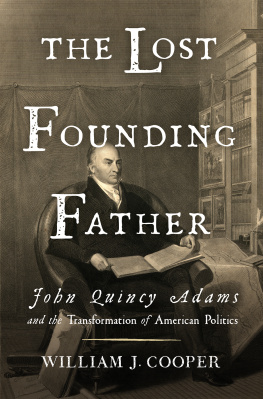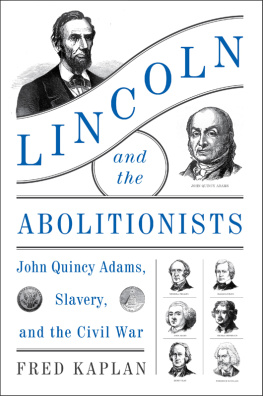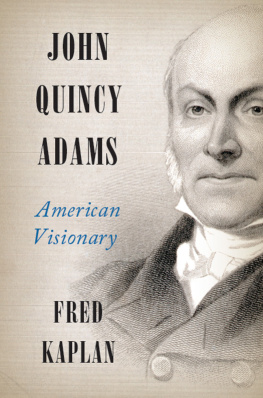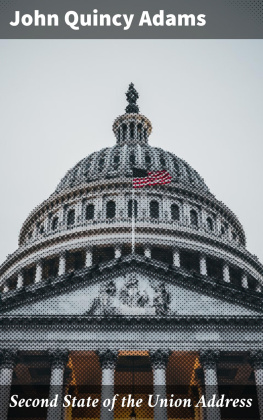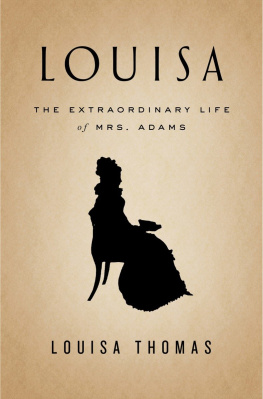The Remarkable Education of John Q uincy Adams
Phyllis Lee Levin

The author and publisher have provided this e-book to you for your personal use only. You may not make this e-book publicly available in any way. Copyright infringement is against the law. If you believe the copy of this e-book you are reading infringes on the authors copyright, please notify the publisher at: us.macmillanusa.com/piracy .
As always, for Bill, and for our family
The early age at which you went abroad gave you not an opportunity of becoming acquainted with your own country. Yet the revolution, in which we were engaged, held it up in so striking and important a light, that you could not avoid being in some measure irradiated with the view. The characters with which you were connected, and the conversation you continually heard, must have impressed your mind with a sense of the laws, the liberties, and the glorious privileges, which distinguish the free, sovereign, independent States of America.
Abigail Adams to John Quincy Adams, December 26, 1783
Contents
Part II
Introduction
W hen President George Washington named John Quincy Adams Minister Resident for the United States of America with their High Mightinesses the States General of the United Netherlands on May 30, 1794, the nominee, both surprised and humbled, was uneasy about his credentials. Neither my years, my experience, my reputation, nor my talents, he fretted to his father, could entitle me to an office of so much responsibility.
Actually, George Washingtons choice was inspired. At 27, John Quincy was a world traveler and remarkable linguisthe spoke not only French and Dutch, but at one time or another studied Italian, Spanish, German and Russian, apart from reading and translating Latin and Greek. He was a graduate of Harvard College with Phi Beta Kappa honors, a lawyer and noted essayist of vibrant controversy in significant political circles. He knew from early youth onward Europes and Americas renowned emissaries, including Benjamin Franklin and the Marquis de Lafayette, and he counted Thomas Jefferson a dear family friend.
He even looked the part. The American artist John Singleton Copley paints him in flowing cravat, his dark hair grazing the collar of his fine, caped coat, as the quintessential young Gainsborough nobleman, though in truth he was instinctively and habitually careless about his dress. At five foot seven inches and inconveniently inclined to be stout, he resembled his mother, Abigail Adams. His face had her clarity, her lean, defined nose, her wide, lofty brow, fair complexion, resolute chin and black eyes of such keenness that they pierced the beholder.
With the announcement of his new post, his uncle Richard Cranch predicted his nephew would be the greatest American Traveller of his Age. He did not exaggerate. John Quincy first sailed for Europe, not quite 11, in 1778, as companion and eventually secretary to his father, one of the three United States Commissioners in Paris. After a brief return home to Braintree, Massachusetts, he and his father headed back to Paris when Congress named John Adams to negotiate peace and commercial treaties with Great Britain. His fathers next assignment, to negotiate a loan for the United States from the Netherlands, took John Quincy to Amsterdam and Leyden. In three years he had attended two schools in Passy, where he became fluent in French, and studied in both Amsterdam and Leyden.
Cultivated in the arts far beyond his years, he was a perceptive and confident critic of painting, sculpture, architecture, music and theater. At age 11, he wrote from Europe to his sister Nabby that Italian comedy was sprightly and agreeable enough but the language the wit the passions the sentiments the oratory the poetry the manners and morals are at the French Comedy.
In July 1781, 14-year-old John Quincy left Amsterdam for Russia to be secretary and interpreter for Francis Dana, Americas newly appointed minister, who knew little if any French, the language of the Russian court. While still a teenager, he crossed and recrossed the Atlantic Ocean and the English Channel, journeyed thousands of miles in raging storm and blinding snow, by leaky ship, slippery ferry, perilous iceboat, mule, carriage and horseback from Spain to France, Holland, Belgium, Denmark, Sweden, the German states, Russia and Great Britain.
Later, with his father as the nations first vice president, John Quincys abilities became well known to President Washington. The two families thrived on terms of much Friendship, visiting each other often in New York, the nations first capital, where the Adamses lived near MacDougal Street. Washington undoubtedly appreciated the young mans published essays eloquently reinforcing the presidents position of neutrality in the war between France and England.
John Quincys commission as minister to the Netherlands followed in 1794. Washingtons confidence in John Quincy only deepened as he tracked his protgs career. It was the presidents decided opinion, that Mr. Adams is the most valuable public character we have abroad, and that he will prove himself to be the ablest of all our diplomatic corps.
As the first president of the United States understood the genius of John Quincy Adams, so did the thirty-fifth. John F. Kennedy wrote of his fellow Bostonian that he held more important offices and participated in more important events than anyone in the history of our nation. During his long lifetimeencompassing the American Revolution, the War of 1812, the early and late Napoleonic AgeJohn Quincy would serve as minister to The Hague, Prussia, Russia and England, and would head the American mission at Ghent to negotiate peace with England and conclude the War of 1812. In the period between his early diplomatic service and ministerial appointments, he was a professor at Harvard, a Massachusetts state senator, and then a United States senator. He turned down an offer to serve on the Supreme Court and made his final journey home upon his appointment as secretary of state for both terms of President James Monroe. Chosen to be the sixth president of the United States in 1824 by the House of Representatives after a contested election, he served only one term. He returned to elected office as a member of the House from November 1831 until his death in February 1848. During his late political career, he
Despite this superlative career, John Quincy, like his father, was haunted by a sense of failure. Having never met the impossibly Olympian standards of his puritan conscience and his demanding intellect, he would conclude at the age of 70 that his whole life has been a succession of disappointments. I can scarcely recollect a single instance of success in anything that I ever undertook.
Kennedy wrote in Profiles in Courage that the lifetime which was so bitterly deprecated by its own principal has never been paralleled in American history. With sympathy, Kennedy recognized the fascination and nobility of this man, unbending, narrow and intractable, who judged himself more severely than his enemies did and possessed an integrity unsurpassed by major political figures. He gave meaning, consistency and character to the early days of the American Republic.
Kennedy applauded the man who loved liberty and the law for standing up for his convictions as a minority of one, for his nonpartisan approach, and for his tireless energies in the struggle against slavery. Had John Quincy served in the contemporary Senate, Kennedy said, we would have admired his courage and determination, but Kennedy was not so certain that we would like him as a person; as it is apparent that many of his colleagues, on both sides of the aisle, did not.
This, in essence, is the dilemma of John Quincys life. Respecting him as a statesman, as Old Man Eloquent was one thing. Liking him was another. John Quincys self-portrait was no more forgiving. He saw the awesome, towering figure he had become as a cold, austere and forbidding character. Sadly, in age and fame, his memory of the small boys pressured wartime life and of the dedicated, brave and adventurous diplomat with tender concern for family, friends and country was forgotten or, worse, made to seem irrelevant.
Next page

